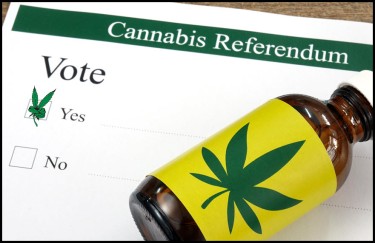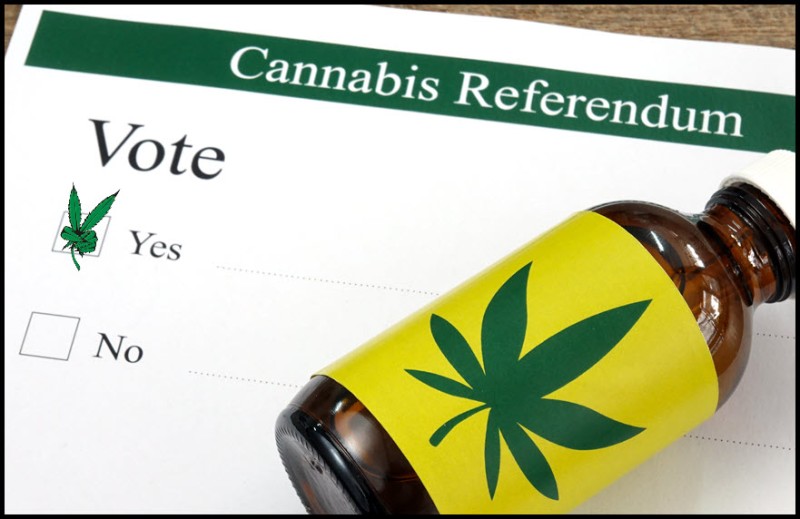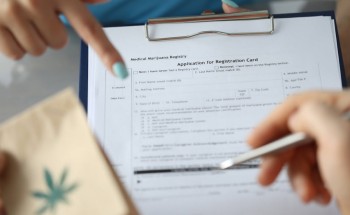
The Day of the election is quickly approaching, and in addition to the important political contests on the ballot in various states, many legislators are closely monitoring the measures to legalize marijuana.
In recent years, there has been an increase in public support for the drug's legalization, and President Joe Biden recently stated that he was granting pardons to thousands of people who had previously been found guilty of federal cannabis possession offenses.
Biden stated in a statement that just as no individual should be held in federal prison simply because of the possession of cannabis, no one should be in a state prison or local jail for the same reason, either.
Currently, cannabis is authorized for medical use in 38 states and adult usage or recreational use in 19.
A group from Oklahoma also gathered enough signatures to qualify for a referendum. However, the state Supreme Court determined that there was not enough time to place the item on the November ballot after protracted legal challenges. A special election will probably be held in 2023 or till the 2024 elections before the initiative can be put into a ballot.
Additionally, Florida, Wyoming, Nebraska, and Ohio are working on ballot referendum campaigns for 2023 or 2024.
In addition to the referendums across the states, voters in a few cities around the nation will determine whether to relax the penalties for marijuana possession and whether to allow regulated cannabis businesses in their communities.
Meanwhile, on election day in 2022, voters in five other states will decide whether to legalize marijuana for recreational use.
ARKANSAS
Due to a denial of certification by the state Board of Elections on the grounds that the text produced by advocacy organization Responsible Growth Arkansas was ambiguous, Issue 4 in Arkansas almost didn't appear on the ballot. But the board's judgment was overruled by the state's Supreme Court in September, opening the door for voters in Arkansas to decide whether or not to legalize cannabis for recreational use.
Adults might buy up to one ounce of marijuana from authorized merchants under the proposed law. Additionally, a 10% sales tax would be imposed on cannabis purchases, which analysts estimate will bring in over $460 worth of tax revenue by 2027, according to Arkansas Business.
Issue 4 lacks a clause allowing criminal records for cannabis offenses to be expunged, unlike several other states.
According to a Politics-Hendrix College & Talk Business poll from September, legalization is supported by 59% of probable voters, while 29% are opposed and 13% are still unsure.
MARYLAND
Advocates were able to place Question 4 on the ballot for voters on November 8 after legislators in Annapolis passed a bill laying the groundwork for its legalization for the recreational use of cannabis.
Voters are prompted with the question, "Do you support the legalizing of cannabis use by a person who is at least 21 years old on or after the 1st of July, 2023, in the State of Maryland?
The amendment in Maryland, if approved, would legalize the growing of up to two cannabis plants for individual use, as well as the sale and carrying of up to 1.5 ounces of marijuana in the state.
People with convictions for possession of fewer than 2.5 ounces would have their convictions automatically wiped, whereas people who have convictions for possession with the intent to distribute might apply to the courts for an expungement three years after serving their sentence.
Retail sales will probably begin in 2024 or 2025 if Question 4's supporters succeed after state lawmakers have passed legislation addressing tax and regulation issues.
According to a Goucher College study conducted in October 2021 (PDF), 60% of Maryland citizens are in favor of legalizing marijuana for recreational use, while just 33% are against it.
MISSOURI
Amendment 3 in Missouri would permit adults to buy and carry up to three ounces of marijuana and grow up to six marijuana plants—six blooming plants, six juvenile plants, and six clones—with a license. Recreational marijuana would be subject to a 6% sales tax, with the money raised going toward drug rehab centers, clinics for veterans, and the state's public defense system.
The amendment would also overturn people's convictions for non-violent cannabis crimes.
The Missouri Department of Health and Senior Services would be in charge of licensing and existing medical marijuana dispensaries; applicants with limited means and those disproportionately affected by drug prohibition would be given preference.
Government projections indicate that legalizing marijuana will cost the state $5.5 million annually while generating at least $40.8 million in revenue. However, with voter permission, specific areas might still outlaw cannabis retailers.
A FOX 4/Emerson College poll conducted in September found that 48% of voters in the state support Amendment 3, 35% oppose it, and 17% are unsure.
NORTH DAKOTA
Measure 2 was written by New Approach North Dakota and basically adopted the language of legislation that was approved by the state's Republican-controlled House of Reps last year but was rejected by the state senate.
In North Dakota, people would be able to buy and possess up to an ounce of marijuana and 4g of cannabis concentrate if the measure succeeds. Additionally, they had the option of growing three plants for their own use.
Cannabis would not be subject to an additional tax, and there aren't provisions for quashing the records of people convicted of crimes relating to marijuana.
Regulators will have until October 1, 2023, to put adult-use cannabis legislation into place.
SOUTH DAKOTA
The legalization of recreational marijuana in South Dakota was approved by voters back in 2020, but the Supreme Court of the state nullified that measure in response to a court challenge brought by the Republican governor, Kristi Noem.
Now, under Measure 27, which South Dakotans created for Improved Cannabis Laws, adults would be able to buy, possess, and grow up to three cannabis plants for personal use.
The current ballot initiative leaves out wording relating to regulation and taxation, which would be covered by the following legislation to avoid a new legal battle.
BOTTOM LINE
Arkansas, Maryland, Missouri, North, and South Dakota are looking to join the recreational marijuana movement, following many other states in the US. The five states will be the latest to legalize recreational cannabis if their respective bills are voted in during the elections.






